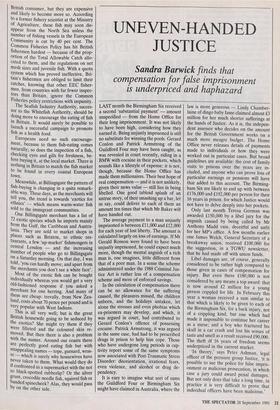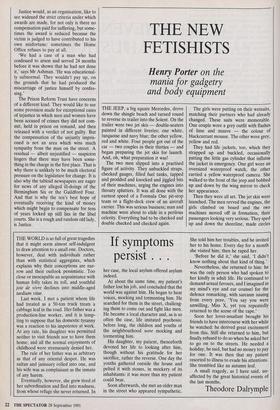UNEVEN-HANDED JUSTICE
Sandra Barwick finds that
compensation for false imprisonment is underpriced and haphazard
LAST month the Birmingham Six received a second `substantial payment' — amount unspecified — from the Home Office for their long imprisonment. It was not likely to have been high, considering how they earned it. Being unjustly imprisoned is still no substitute for winning the pools. Gerard Conlon and Patrick Armstrong of the Guildford Four may have been caught, as was revealed in court recently, riding in a BMW with cocaine in their pockets, which sounds like a lifestyle of expense: it is not, though, because the Home Office has made them millionaires. Their best hope of real compensation — and it is not unlikely, given their news value — still lies in being libelled. One good tabloid splash of an untrue story, of their smashing up a bar, let us say, could deliver to each of them an amount ten times that which Mr Baker will have handed out.
The average payment to a man unjustly imprisoned is between £11,000 and £12,000 for each year of lost liberty. The amount is calculated largely on loss of earnings. If Mr Gerald Ronson were found to have been unjustly imprisoned, he could expect much more, though the mental anguish of a rich man is, one imagines, little different from that of a poor man. In a sense the scheme administered under the 1988 Criminal Jus- tice Act is rather less of a compensation scheme and more of enforced savings.
In the calculation of compensation there can be no allowance for the suffering caused, the pleasures missed, the children unborn,. and the holidays untaken, let alone the stresses and even phobias which ex-prisoners may develop, and which, it was argued in court, had contributed to Gerard Conlon's offence of possessing cocaine. Patrick Armstrong, it was argued in the same case, had had to be prescribed drugs in prison to help him cope. Those who have undergone long periods in cap- tivity report some of the same symptoms now associated with Post-Traumatic Stress Disorder: disorientation, irrational fears, even violence, and alcohol or drug de- pendency.
It is easy to imagine what sort of sums the Guildford Four or Birmingham Six might have claimed in Australia, where the law is more generous — Lindy Chamber- laine of dingo baby fame claimed almost £3 million for her much shorter sufferings at the hands of Justice. As it is, the indepen- dent assessor who decides on the amount for the British Government works bn a much more meagre budget. The Home Office never releases details of payments made to individuals or how they were worked out in particular cases. But broad guidelines are available: the cost of family visits to prisons over the years are in- cluded, and anyone who can prove loss of particular earnings or pensions will have that added to this account. The Birming- ham Six are likely to end up with between £176,000 and £192,000 per person for their 16 years in prison. for which Justice would not have to delve deeply into her pockets.
Only last month Teresa Gorman was awarded £150,000 by a libel jury for the anguish caused by being called by Mr Anthony Mudd vain, deceitful and unfit for her MP's office. A few months earlier one James Welch, General Secretary of a breakaway union, received £100,000 for the suggestion, in a TGWU newsletter, that he had made off with union funds.
Libel damages are, of course, generally considered to be rather high compared to those given in cases of compensation for injury. But even there £180,000 is not considered by any means a top award: that is now around £2 million for a young person crippled for life. In February this year a woman received a sum similar to that which is likely to be given to each of the Birmingham Six, for a back injury, not of a crippling kind, but one which had made it impossible to continue her career as a nurse; and a boy who fractured his skull in a car crash and lost his senses of taste and smell as a result received £90,000. The theft df 16 years of freedom seems underpriced in the current market.
'In theory,' says Peter Ashman, legal officer of the pressure group Justice, 'it is possible to sue the police for false impris- onment or malicious prosecution, in which case a jury could award penal damages. But not only does that take a long time, in practice it is very difficult to prove that individual officers have been malicious.' Justice would, as an organisation, like to see widened the strict criteria under which awards are made, for not only is there no compensation paid for suffering, but some- times the award is reduced because the victim is judged to have contributed to his own misfortune: sometimes the Home Office refuses to pay at all.
`We had a case of a man who had confessed to arson and served 24 months before it was shown that he had not done it,' says Mr Ashman. 'He was educational- ly subnormal. They wouldn't pay up, on the grounds that he had produced the miscarriage of justice himself by confes- sing.'
The Prison Reform Trust have concerns of a different kind. They would like to see some provision made for exceptional cases of injustice in which men and women have been accused of crimes they did not com- mit, held in prison on remand, and then released with a verdict of not guilty. But the compensation of the unjustly impris- oned is not an area which wins much sympathy from the man on the street. A residual — albeit unjustified — suspicion lingers that there may have been some- thing in the charge in the first place. That is why there is unlikely to be much electoral pressure on the legislature for change. It is also why the tabloid newspapers are eager for news of any alleged ill-doings of the Birmingham Six or the Guildford Four. And that is why the ten's best hope of eventually receiving the kind of money which might begin to compensate for tens of years locked up still lies in the libel courts. She is a rough and random old lady, is Justice.



































































 Previous page
Previous page